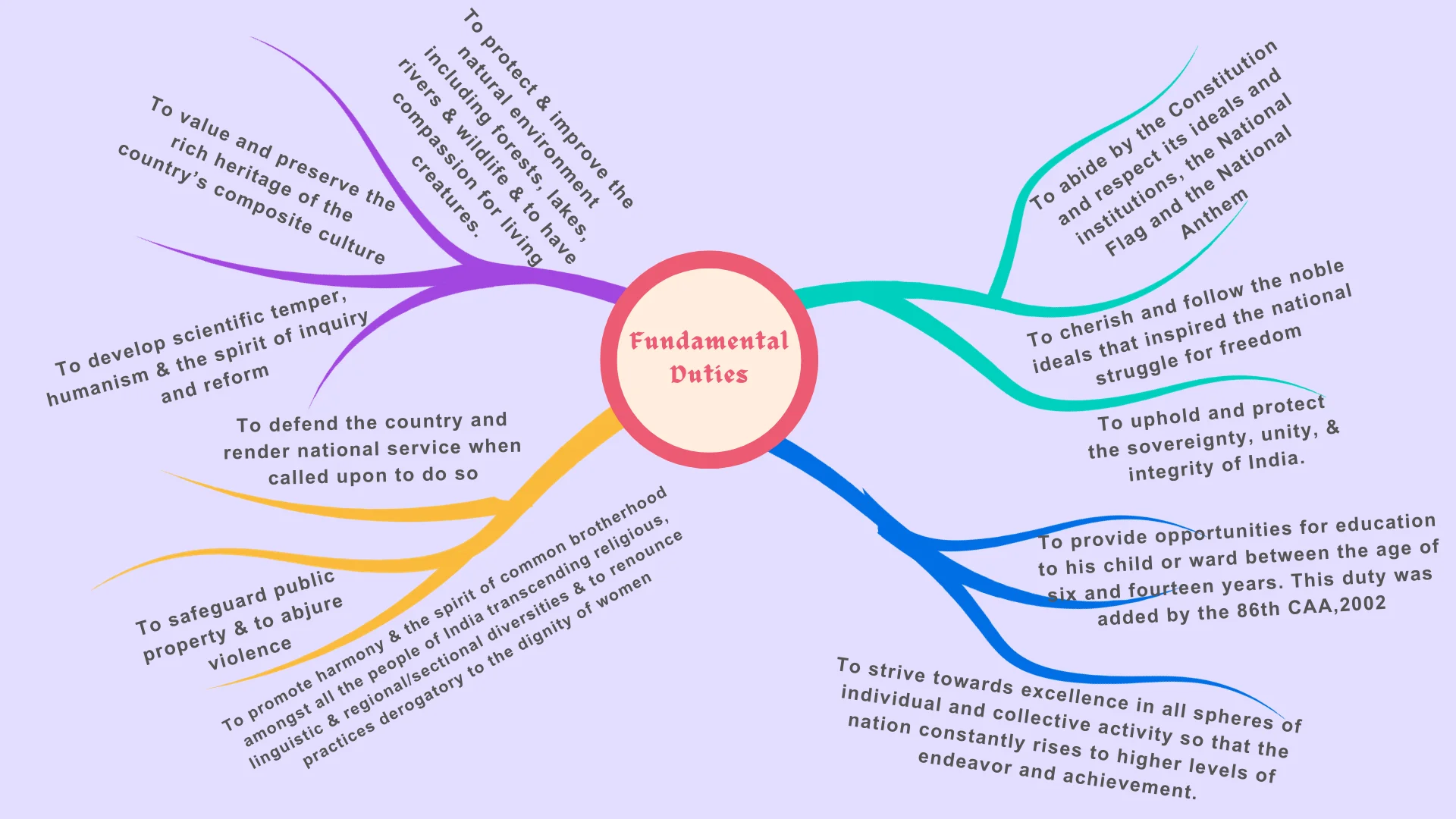Fundamental Duties in the Indian Constitution are obligations for citizens, such as respecting national symbols and upholding the nation’s integrity. Added in 1976 and updated in 2002, these duties aim to promote responsible citizenship and national unity. They guide individuals in contributing positively to society and maintaining the country’s values.
Fundamental Duties in the Indian Constitution
Historical Background
- Initial Exclusion of Fundamental Duties: The framers of the Constitution initially did not find it essential to include the Fundamental Duties of citizens within the Constitution.
- Incorporation into the Constitution (1976): It wasn’t until 1976 that the Fundamental Duties of citizens were eventually incorporated into the Constitution.
- 42nd Constitutional Amendment Act: These duties were added to Part IV-A of the Constitution through the 42nd Constitutional Amendment Act in 1976, based on the recommendations of the Swaran Singh Committee.
- Influence: This was inspired from the Soviet Union Constitution.

Enroll now for UPSC Online Course
Swaran Singh Committee
Analysis by the Swaran Singh Committee: Following a comprehensive analysis of historical events and the repercussions of internal emergencies, the Swaran Singh Committee put forth a series of proposals outlining the ideal path forward for the citizens of India.
- Eight Suggested Duties: The Swaran Singh Committee suggested eight duties to be incorporated in the constitution as duties of the citizens
- Recommendations:
- To respect and abide by the Constitution and the laws.
- To uphold the sovereignty of the nation and to function in such a way as to sustain and strengthen its unity and integrity.
- To respect the democratic institutions enshrined in the Constitution, and not to do anything which may impair their dignity or authority.
- To defend the country and to render national service including military service when called upon to do so.
- To abjure communalism in any form.
- To render assistance and cooperation to the State in the implementation of Directive Principles of State Policy and to promote the common good of the people so as to sub-serve the interests of social and economic justice.
- To abjure violence; to protect and safeguard public property and not to do anything which may cause damage or destruction to such property.
- To pay taxes according to the law.
- Rejection of Some Recommendations: However, the then Government led by Prime Minister Indira Gandhi did not accept all suggestions or recommendations made by the Swaran Singh Committee like duty to pay taxes.
- Addition of Duties: In 2002, an additional duty was added through the 86th Constitutional Amendment Act, 2002, ensuring citizens’ roles in nation-building.
- Commitment to a Responsible and Progressive Society: This evolution underscores our commitment to fostering a responsible, conscientious society where rights and duties coexist, shaping a progressive nation.
Fundamental Duties Under Article 51A of the Indian Constitution
As Per Article 51A Of The Indian Constitution, It Is The Responsibility Of Every Citizen Of India To –
- Duty of Respect: To abide by the rules of the Constitution and respect its ideals, institutions, the National Flag, and the National Anthem.
- Duty to Cherish: To cherish and follow the noble ideals which inspired our national struggle for freedom.
- Duty to Uphold: To uphold and protect the sovereignty, unity, and integrity of India.
- Duty to Defend: To defend the country and render the national service when called upon to do so.
- Duty of Promotion: To Promote harmony and the spirit of common brotherhood amongst all the people of India, transcending religious, linguistic, and regional or sectional diversities, and renouncing practices derogatory to the dignity of women.
- Duty to Preserve: To value and preserve the rich heritage of our composite culture.
- Duty of Protection: To Protect and improve the natural environment, including forests, lakes, rivers, and wildlife, and to have compassion for living creatures.
- Duty of Nurturing Scientific Temper and Humanism: To develop the scientific temper, humanism, and the spirit for inquiry and reform.
- Duty to Safeguard Public Property: To safeguard public property and to abjure violence.
- Duty Towards Excellence: To strive towards excellence in all spheres of individual and collective activity so that the nation constantly rises to higher levels of endeavour and achievement.
- Duty to Provide Opportunities: To provide opportunities for education to children, or as the case may be, wards between the ages of six and fourteen years. (It was added by the 86th Constitutional Amendment Act, 2002)

Features of Fundamental Duties
Moral and Civic Duties: Some Fundamental Duties are moral duties, while others are civic duties.
- Moral duties, such as cherishing noble ideals of the freedom struggle, are not enforceable by law.
- Civic duties, such as respecting the Constitution, National Flag, and National Anthem, are enforceable by law.
- Rooted in Indian Tradition: The Fundamental Duties are rooted in Indian tradition, mythology, religions, and practices, reflecting the traditional Indian values of dharma, tyaga, samata, ekata, rashtra-bhakti, veerata, karmayoga, sarvadharma sambhava, vasudhaiva kutumbakam, samskriti raksha, anekata, prithvi puja, eko yogi ekobhogi, jijnasu, vidya, ahimsa, aparigraha, kaushalam, and uttam.
-
- They essentially contain just a codification of tasks integral to the Indian way of life.
- Limited to Citizens: Unlike some Fundamental Rights, which extend to all persons, whether citizens or foreigners, the Fundamental Duties are confined to Indian citizens only.
- Non-justiciable: Like the Directive Principles of State Policy, the Fundamental Duties are non-justiciable.
- This means that the courts cannot directly enforce them.
-
- However, the Parliament is free to enforce them by suitable legislation.
Significance of Fundamental Duties
Despite facing criticisms and opposition, the Fundamental Duties are regarded as significant for the following reasons:
- Cultivating Moral and Ethical Values: They encourage the inculcation of moral and ethical values, contributing to the overall character development of citizens and the betterment of society as a whole.
- Balancing Rights and Responsibilities: They strike a balance between individual rights and responsibilities, emphasizing that citizens’ rights should be exercised while respecting societal norms and obligations.
- Preserving National Integrity: Fundamental Duties contribute to national unity and integrity by instilling a sense of patriotism and a commitment to the country’s well-being.
- Fostering Social Harmony: They promote social harmony and respect for diverse cultures, religions, and languages, reducing conflicts and tensions within society.
- Protecting Constitutional Values: Fundamental Duties reinforce the values and principles enshrined in the Constitution, ensuring the preservation of India’s democratic and secular character.
- Strengthening the Rule of Law: They reinforce respect for the rule of law and help in the maintenance of law and order, contributing to a just and orderly society.
- Encouraging Environmental Consciousness: Fundamental Duties highlight the importance of environmental protection, promoting sustainable development and ecological responsibility.

Enroll now for UPSC Online Course
| Must Read | |
| Current Affairs | Editorial Analysis |
| Upsc Notes | Upsc Blogs |
| NCERT Notes | Free Main Answer Writing |
Conclusion
Fundamental Duties play a crucial role in balancing citizens’ rights with their responsibilities, promoting ethical values and national integrity.
- They help strengthen social harmony, uphold constitutional values, and encourage environmental protection.
- Though non-justiciable, these duties guide citizens towards a more conscientious and unified society.
Sign up for the PWOnlyIAS Online Course by Physics Wallah and start your journey to IAS success today!
| Related Articles | |
| Major Constitutional Amendments: Evolution of India’s Constitution | Indian Constitution |
| ENVIRONMENT | Fundamental Duties – Part IV A |

 GS Foundation
GS Foundation Optional Course
Optional Course Combo Courses
Combo Courses Degree Program
Degree Program










